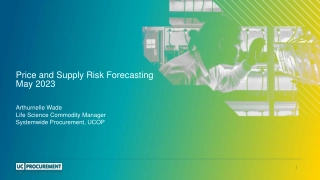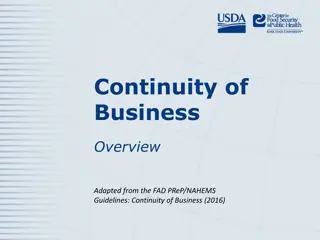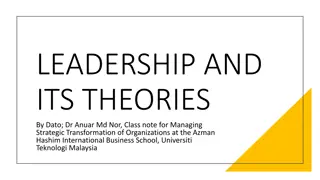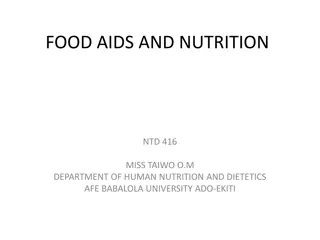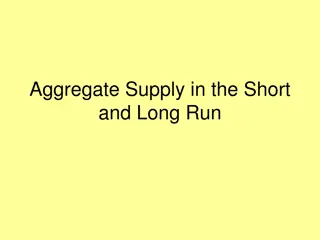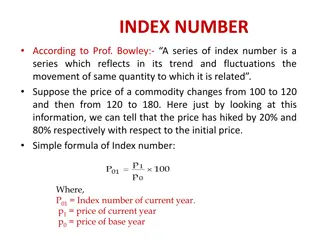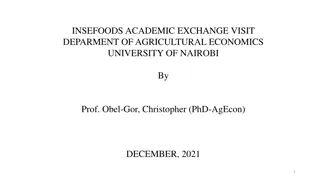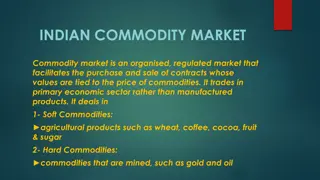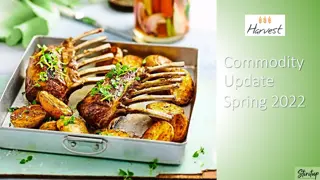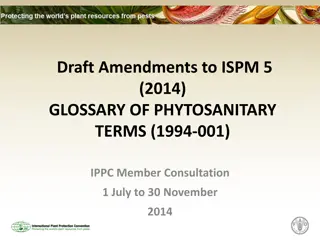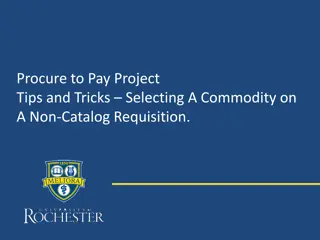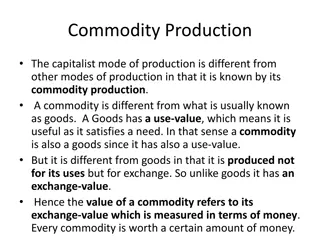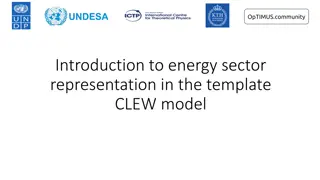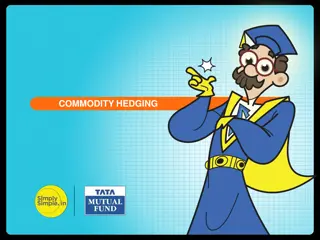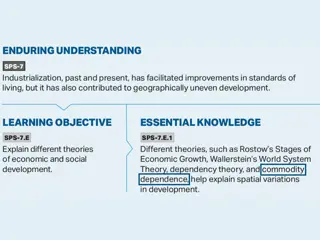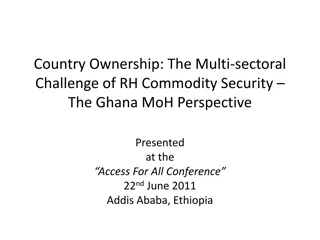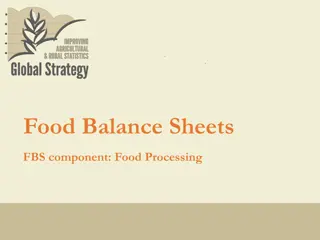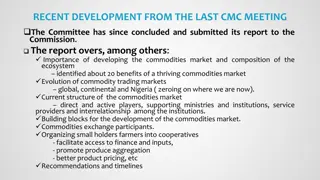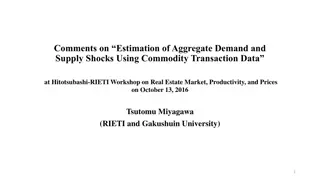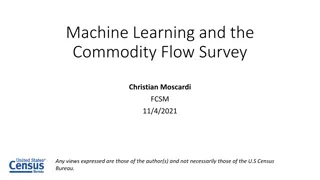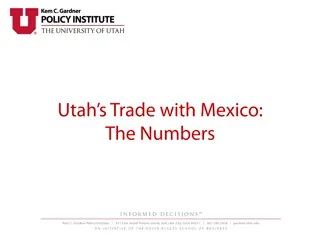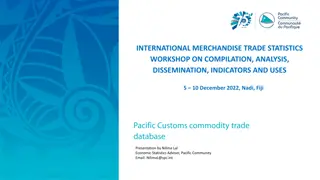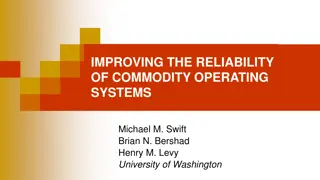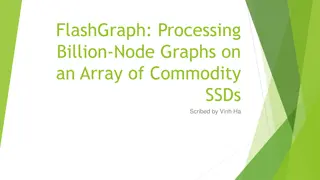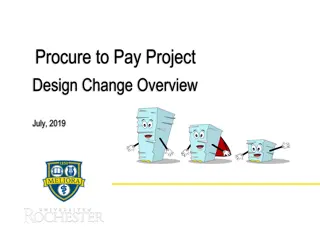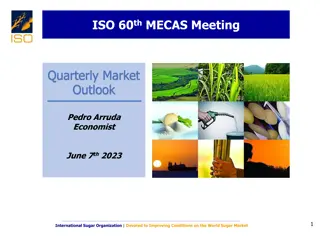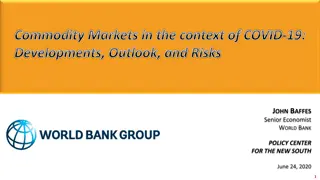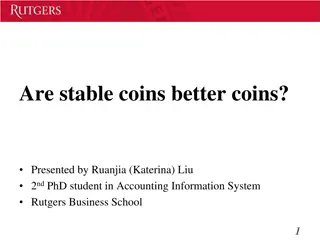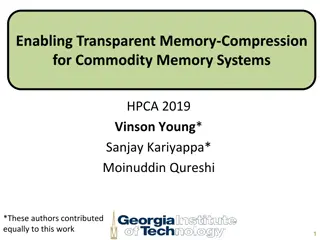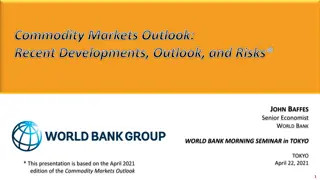Price and Supply Risk Forecasting May 2023
Stay updated on the latest Consumer Price Index trends, construction cost index, and supply chain risks in May 2023. Get insights from Arthurnelle Wade, Life Science Commodity Manager at UCOP.
2 views • 11 slides
Utah’s Trade with Mexico: The Numbers
Utah's total commodity exports to Mexico, highlighting the trade relationship between the two regions.
1 views • 7 slides
Streamlined Forecasting for Future USDA Foods Utilization
Cathy Sparks, National Commodity Director, discusses the importance of communication in the forecasting process for USDA foods. Tools like the ProcessorLink calculator and K12 On Target planner help processors and distributors estimate quantities needed for production. Commodity Planning Made Easy s
1 views • 9 slides
Evolution of the Sugar Industry: From Ancient Times to Global Production
Explore the historical journey of the sugar industry from ancient cultivation practices to modern global production, highlighting key milestones such as the introduction of sugar production in India, global production statistics, and the intricate process involved in manufacturing sugar. Discover th
4 views • 53 slides
Enhancing Scalability and Performance in Deep Recommendation Systems with EVStore
EVStore presents a novel approach to scaling embedding tables in deep recommendation systems, offering a three-layer caching system that optimizes storage and caching capabilities. By leveraging groupability-aware caching, mixed-precision caching, and embedding approximation, EVStore achieves lighte
3 views • 33 slides
Comprehensive Overview of Continuity of Business in FAD Outbreaks
Continuity of Business (COB), also known as managed movement, is a crucial strategy that allows the movement of non-infected animals and non-contaminated animal products during a Foreign Animal Disease (FAD) outbreak. This approach helps maintain normal business operations in agriculture and food in
4 views • 27 slides
Evolution of Leadership Theories: A Historical Overview
Leadership has evolved over the decades, from emphasizing control and domination in the early 20th century to a focus on influence and shared goals in recent years. The definition of leadership has shifted from individual traits to group dynamics and organizational effectiveness, highlighting the co
0 views • 90 slides
Understanding Global Economic Convergence Trends: Insights from Jeffrey Frankel’s Keynote at G20 Global Financial Stability Conference 2021
Jeffrey Frankel discussed the potential impact of the pandemic on global economic convergence at the G20 Global Financial Stability Conference 2021. Despite a resilient world economy in the first half of 2021, downside risks persist due to monetary and fiscal stimuli. The divergence between Emerging
1 views • 17 slides
Types of Feeding Programmes in Food Aids and Nutrition
General Food Distribution (GFD) is a crucial aspect of aiding populations in emergencies with food rations. It aims to cover immediate basic food needs, prevent malnutrition and death, and restore regular livelihoods. The distribution can be complete or targeted, adapting rations to family sizes and
0 views • 25 slides
Understanding Aggregate Supply in the Short and Long Run
Aggregate Supply in the short and long run is crucial in understanding the relationship between the economy's price level and the total quantity of goods and services produced. In the short run, sticky wages and production costs play key roles in determining supply levels, while in the long run, cha
0 views • 16 slides
Understanding Index Numbers in Economics
Index numbers are essential in economics to compare trends and fluctuations in data, reflecting changes in quantities over time. They help analyze relative changes and are expressed as percentages. Base year selection, representative prices, and commodity inclusion are crucial in constructing accura
1 views • 12 slides
Understanding DDTC: Commodity Jurisdiction and Classification Process
Explore the Directorate of Defense Trade Controls (DDTC) and its role in regulating defense exports for national security. Delve into the Commodity Jurisdiction and Classification Process, guided by the Arms Export Control Act and International Traffic in Arms Regulations. Learn about DDTC's backgro
0 views • 48 slides
Unlocking Agricultural Sector Potential Through Value Chain Analysis
Agricultural entrepreneurship is vital for economic growth in Kenya. This academic exchange visit to the University of Nairobi highlights the importance of agripreneurship and commodity value chain analysis in maximizing the sector's potential. The key focus is on identifying, mapping, and addressin
0 views • 15 slides
Understanding the Indian Commodity Market: Participants, Segments, and Structure
The Indian Commodity Market is a vital part of the economy, comprising participants like hedgers, speculators, and arbitrageurs. It operates through segments such as the derivatives, spot, and futures markets, facilitated by entities like the Ministry of Finance and Commodity Exchanges. The transact
0 views • 10 slides
Spring 2022 Commodity Update: Energy, Labour, and Market Insights
The Spring 2022 Commodity Update provides an overview of the current market conditions including energy and fuel price challenges, labor shortages in the UK food sector, and the impact on supply chains. Rising energy costs, particularly gas, and labor scarcity due to Brexit and Covid-19 are signific
0 views • 40 slides
Understanding Utility Theory in Economics
Utility theory in economics explores the concept of utility, which refers to the satisfaction or want-satisfying capacity a commodity provides to consumers. It is subjective, relative, and can vary among individuals. Cardinal utility analysis quantifies utility in numbers, while total utility and ma
3 views • 13 slides
Innovative CPC Futures Contract Program for Agribusiness Sustainability
The Commodity Plus Carbon (CPC) Futures Contract Program integrates agricultural commodity prices with carbon valuation to incentivize good agricultural practices and reduce carbon footprint. By combining ag commodity prices with carbon reductions, CPC contracts offer hedging opportunities and incen
0 views • 8 slides
Proposed Amendments to ISPM 5 (2014) Glossary of Phytosanitary Terms
The draft amendments to ISPM 5 (2014) Glossary propose additions and revisions to terminology related to phytosanitary measures. Changes include defining bark as a commodity, adding a declaration for regulated articles, and distinguishing between grain and seeds as commodity classes. The updates aim
0 views • 8 slides
Tips for Selecting Commodity on Non-Catalog Requisitions
When creating a non-catalog request, choosing the right commodity is crucial. This guide provides tips on selecting the appropriate commodity to streamline the procure-to-pay process effectively.
0 views • 5 slides
Understanding Commodity Production and Labor in Capitalist Mode
The capitalist mode of production is characterized by commodity production, where goods are produced not for their use but for exchange. The value of a commodity is determined by its exchange value, measured in money, which is influenced by the quantity of labor involved in its production. Labor, be
0 views • 8 slides
Energy Sector Model Structure and Commodity Abbreviations
This content showcases the template model energy system structure customizable for country projects, focusing on the power sector and providing simplified demand and supply representations. It also details the energy sector model structure encompassing various sectors, commodities, and abbreviations
1 views • 9 slides
Understanding Commodity Hedging in Financial Markets
Commodity hedging involves mitigating risk associated with price fluctuations in raw materials by taking opposite positions in futures and physical markets. This strategy helps individuals and businesses safeguard against potential losses and ensure revenue certainty. An example with a wheat farmer
0 views • 10 slides
Analysis of Global Commodity Export Dependence Trends 2013-2017
The analysis includes data from the State of Commodity Dependence 2019 PDF, focusing on the degree of commodity export dependence of countries worldwide from 2013 to 2017. It examines specific countries falling into different percentage categories and explores the factors contributing to their posit
0 views • 11 slides
Enhancing RH Commodity Security: Ghana MoH Perspective
Ghana's Ministry of Health (MoH) emphasizes country ownership in addressing the multi-sectoral challenges of reproductive health (RH) commodity security. The MoH highlights the importance of stakeholder involvement in national planning, coordination mechanisms, and strategic frameworks to improve ma
0 views • 18 slides
Understanding Food Processing Data for Balance Sheets
Food processing data is crucial for balance sheets, necessitating the consideration of official and alternative sources, as well as approaches for imputation and estimation. Industrial output surveys, agricultural production surveys, and data from commodity organizations play key roles in determinin
0 views • 11 slides
Understanding Demand in Economics
Demand in economics refers to the quantity of a commodity that consumers wish to purchase at a given price level. It is the desire backed by purchasing power, distinguishing it from mere desire or wish. Factors influencing demand include the price of the commodity, prices of related goods (substitut
1 views • 8 slides
Recent Developments in Commodity Market Ecosystem and Global Competitiveness of Nigeria
The recent report from the last CMC meeting highlights the significance of developing the commodities market and the ecosystem's composition. It identifies multiple benefits of a thriving commodities market and discusses the evolution of commodity trading markets globally, continentally, and in Nige
0 views • 6 slides
Estimation of Aggregate Demand and Supply Shocks Using Commodity Transaction Data
This study presented at Hitotsubashi-RIETI Workshop analyzes demand and supply shocks using commodity transaction data. By estimating elasticity parameters and examining movements in price and quantity, the research identifies negative supply shocks post-global financial crisis and after 2013. The p
0 views • 8 slides
Machine Learning in Commodity Flow Survey: Improving Data Quality
Exploring the application of machine learning in the Commodity Flow Survey (CFS), this report discusses the use of logistic regression models to correct and impute shipment data. The upcoming shift to eliminate manual SCTG product code provision aims to enhance respondent experience and response rat
0 views • 15 slides
Utah's Commodity Trade with Mexico: Insights and Impacts
Explore Utah's total commodity exports and imports with Mexico, top commodity exports, economic impacts of reduced trade, and more through insightful visuals depicting trade dynamics in 2016. Gain valuable insights into Utah's trade relationships and economic implications of changes in commodity tra
0 views • 7 slides
International Merchandise Trade Statistics Workshop Overview
Presentation by Nilima Lal at the International Merchandise Trade Statistics Workshop in Nadi, Fiji focusing on the compilation, analysis, and dissemination of trade data. The workshop emphasizes the importance of relevant information on imported and exported goods, development partners collaboratin
0 views • 10 slides
Improving the Reliability of Commodity Operating Systems
This research paper discusses the challenges and solutions in enhancing the reliability of commodity operating systems by addressing system failures caused by kernel extensions. The Nooks approach isolates extensions within protection domains, allowing them to reside in the kernel address space with
0 views • 40 slides
FlashGraph: Processing Billion-Node Graphs on Commodity SSDs
FlashGraph proposes a system that combines SSDs and RAM for efficient graph processing, storing vertices in memory and edge lists in SSD storage. The system can handle large graphs without using excessive memory and boasts performance comparable to in-memory graph processing engines. While SSDs offe
0 views • 6 slides
Procure to Pay Project Design Change Overview
Detailed overview of the procure to pay project design change starting July 2019. Topics include commodity dimension, financial approvals, non-catalog requisitions, and new fields for purchase requisitions. The implementation of a Commodity field for accurate routing of purchase requisitions is high
0 views • 14 slides
International Sugar Market Quarterly Outlook Analysis
The ISO 60th MECAS Meeting highlights currency movements, domestic prices, commodity prices, and fuel ethanol trends. The report discusses the performance of selected currencies against the US Dollar, domestic price changes in various countries, and the efforts of the International Sugar Organizatio
0 views • 15 slides
Exploring Commodity Frontiers and Urbanization in Brazilian Cinema and Literature
The texts "Inferno" by Patricia Melo and "City of God" directed by Fernando Meirelles and Kátia Lund depict the shaping of Rio's history by commodity frontier movements in Brazil. These movements include the migration of people to cities due to agricultural crises, emergence of drug trade, particul
0 views • 19 slides
Impact of COVID-19 on Commodity Markets: Developments, Outlook, and Risks
The COVID-19 pandemic has caused significant disruptions in global commodity markets, leading to forecasts of decreased global growth, oil price reductions, and shifts in metal and gold prices. The challenging economic outlook includes projections of a 5.2% contraction in global GDP in 2020, with ri
0 views • 18 slides
Understanding Stablecoins: A Detailed Analysis by Katerina Liu
Stablecoins, a type of cryptocurrency designed to minimize price fluctuations, come in four main types: fiat collateralized, commodity collateralized, crypto collateralized, and non-collateralized. Among these, fiat-based stablecoins have shown higher survival rates compared to commodity-backed ones
0 views • 14 slides
Enhancing Memory Bandwidth with Transparent Memory Compression
This research focuses on enabling transparent memory compression for commodity memory systems to address the growing demand for memory bandwidth. By implementing hardware compression without relying on operating system support, the goal is to optimize memory capacity and bandwidth efficiently. The a
0 views • 34 slides
Overview of Commodity Markets: Recent Developments and Outlook
This document provides insights into the recent developments, outlook, and risks in commodity markets. It covers global economic prospects, commodity prices pre- and post-COVID, longer-term perspective, oil prices since 2011, and half a century of real oil prices. The data and analysis offer a compr
0 views • 20 slides
